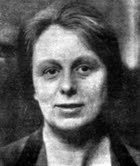
Long before women were represented in Parliament, they were active in trade unions, campaigning for the rights of all working people. The history of these early labour activists is less well-known than that of their male counterparts. Yet women have historically played a crucial role in all aspects of trade unionism – organising and recruiting members, advising on the issues facing workers, and leading campaigns to improve working conditions.
Mary Quaile was just 12 years old when she left school to work as a domestic servant in England. The year was 1898; servants had few rights and child workers were even more vulnerable. As soon as she was able, she fled the harshness of domestic servitude to seek work in France, before taking a job in a Manchester cafe.
In 1909, inspired by the trade union leader Margaret Bondfield, and no doubt by her Irish father’s involvement in the Brick and Stone Layers Union, Mary decided to set up a union for cafe workers in Manchester. Two years later, she was offered the job of Assistant Organising Secretary at the Manchester Women’s Trade Union Council.
In the years before the First World War, Mary and the Organising Secretary, Olive Aldridge, held hundreds of meetings with women in different types of employment. They found that one of the most common complaints by women workers was being unfairly dismissed from their jobs. In the winter of 1911-12, they raised money to support 300 mill workers from Bradford who were on strike due to low wages. The majority of the mill workers were girls and women. In 1914, Mary was promoted to Organising Secretary, a post she held throughout the War.
Throughout her life, Mary held various positions in trade unions, always highlighting the particular issues faced by women and girls. In 1925 she led a delegation to the Soviet Union to research conditions for women and girls. A year later, she addressed an estimated crowd of 20,000 people in Manchester during the General Strike, urging striking workers remain peaceful and not to provoke the authorities.
After retiring due to ill-health, Mary continued to volunteer for Manchester Trades Council until her death in 1958. Her obituary in the Manchester Guardian celebrated her “determination to get trade unionism for women accepted”. The newspaper recalled that, even though she was “often met with jeers, boos, rotten apples, and threats of violence, [she] never betrayed any sign of fear.”
So many of the women who campaigned alongside Mary Quaile are forgotten today, and the women’s rights activists we remember tend to be from more privileged backgrounds. Yet Mary’s own working-class roots reflected the people she fought for, and brought her closer to them. She was remembered by those close to her for her “warmth and lovable personality”. For the rest of us, her courage and determination shine through in the hard-won rights that we often take for granted.
(Photo: Mary Quaile. Copyright holder unknown. Please contact me if you are the copyright holder for this image.)